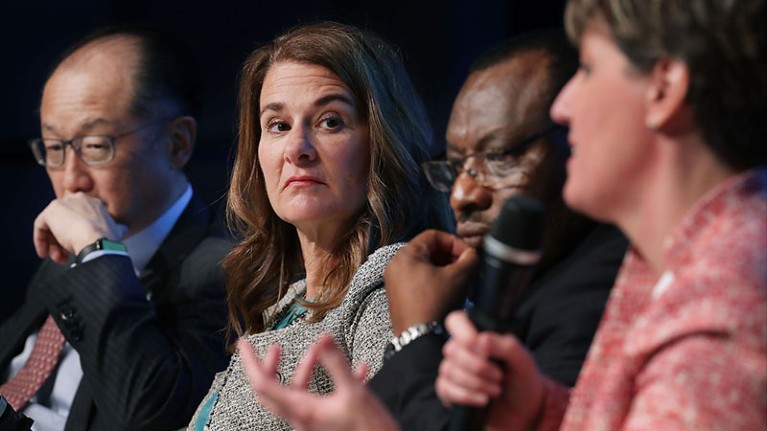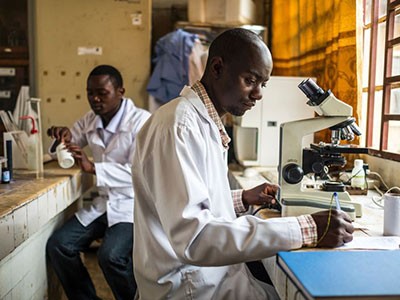
From left to right, Jim Yong Kim, Melinda Gates, Claver Gatete and Marie-Claude Bibeau discuss a World Bank Group initiative in 2017.Credit: Chip Somodevilla/Getty
Last month, the African Development Bank concluded its annual shareholder meetings. The bank, which provides around US$7.5 billion of funding annually for large-scale infrastructure, is asking the 81 nations that provide its capital for more money to boost businesses, energy and trade. Yet, the words ‘science’ and ‘universities’, and even ‘innovation’ and ‘research’, are nowhere to be found in the final agreement from the meetings. There’s also no mention of education or technology.
This exemplifies a problematic paradox in international development. Most economies of the poorest countries are growing, albeit modestly, but most of their governments show little enthusiasm for improving the capacity for, and standards in, research. It’s as if they have decided that if economies can grow without research, then there’s little need to bother investing in more of it. But such neglect can be devastating for universities and will ultimately backfire for the countries too.
A Nature Comment article last month1 described just how parlous things have become in many countries and urgently called for more home-grown researchers in Africa. The authors appeal for more international assistance — and one of their ideas is for richer countries to provide bespoke funding opportunities for their scientists to work with counterparts in the developing world.
Such opportunities exist already, for example, through the UK government’s £735-million (US$923-million) Newton Fund, and the Chinese government is funding more of its research community to work on scientific projects in low-income countries. But both of these funders expect that the governments of recipient countries will provide matching grants, and this is a welcome development.
In purely monetary terms, matching funding doubles the size of available grants, but there are other benefits too. When a recipient nation puts its own money on the table, its researchers can exert more influence in decision making, and it avoids a situation in which institutions that are largely dependent on donor grant funding become more vulnerable when donors walk away.
Members of a group of 43 independent policy-research centres in 20 countries in Africa, Asia and Latin America are now facing such a scenario. For the past decade, this group has benefited from a generous Can$200-million (US$153-million) grant as core funding for building research capacity and ensuring that good research informs national and regional policy debates. Donors included the Bill & Melinda Gates Foundation in Seattle, Washington, and Canada’s International Development Research Centre in Ottawa.
The grant ended as scheduled this year, and already some of the centres are struggling, according to an evaluation report published at the end of April. The report is too diplomatic to point out that this would not have happened had the consortium required that its generosity be matched by income from local sources.
Matched funding is not easy to obtain, especially from the public sector of poorer countries, and it is complicated to administer. Research tends to be a lower priority for nations that lack more urgent, basic necessities, such as quality primary education, health care, energy and transport infrastructure.
Nature Outlook: Science without borders
But there’s also domestic philanthropy: most developing countries have wealthy, home-grown investors, and many already fund education and, to some extent, research. It’s time for these investors to address the need for much more substantial funding in research and in universities — investments that will pay off in the long term. All forms of philanthropy need oversight. The involvement of international public funders — through matched-funding arrangements — should help to lift and maintain standards of funding transparency and accountability.
International development funders should contribute, but their funding will stretch further and last longer if the recipient countries — and their own investors — commit to doing more.


 Build science in Africa
Build science in Africa
 Chinese investments fuel growth in African science
Chinese investments fuel growth in African science
 A new model for disease research in Africa
A new model for disease research in Africa
 World Bank pours hundreds of millions into African science
World Bank pours hundreds of millions into African science
 Nature Outlook: Science without borders
Nature Outlook: Science without borders








